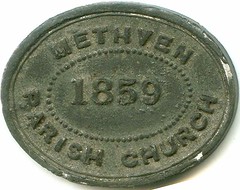
PREV ARTICLE
FULL ISSUE
PREV FULL ISSUE
FEATURED WEB SITE: COMMUNION TOKENSThis week's Featured Web Site is a short history of Communion tokens. It was suggested by Arthur Shippee, who writes: In a recent sermon in our Presbyterian church, our co-pastor mentioned Communion tokens. The tokens showed one was in good standing, and was submitted to be able to receive communion. Do any of our readers collect these?
Communion tokens are a great area of collecting, and many books have been published on them. Often the books are much rarer than the tokens, although in the case of U.S. tokens the opposite is generally true - U.S. communion tokens are generally rare. I have some of these from Allegheny City, PA, and co-authored an article on them with Larry Dziubek.
-Editor

John Calvin first recommended Communion tokens with the intent that no unworthy person would be admitted to the communion service. They were first use in the Reformed Church of France in the year 1560. The Dutch used tokens in Amsterdam as early as 1586. England and Ireland began to use communion tokens near the end of the 16th century when authorities found it useful to know who did or did not conform to the legal for of worship of the state church. But it was in the Presbyterian Churches of Scotland that communion tokens were most widely used. Many believe that there may have been a second reason for using tokens, and that was to protect communicants from betrayal by spies during periods of religious persecution. Communion tokens were used in the Presbyterian Churches of Scotland until World War I. A number of other churches have issued tokens in recent years, but these are normally replicas to commemorate a centennial or some other anniversary. Communion tokens have been used in Great Britain, Ireland, France, Germany, Greece, Netherlands, Italy, Africa, India, South America, the West Indies, Australia, New Zealand, and Canada. Churches in at least 24 states in the United States issued communion tokens, with over 400 recorded varieties in Pennsylvania. Tokens were used by churches in Freeport, Deer Creek, Glade Run, and Parnassus, plus six different churches in Pittsburgh and three in Allegheny City. But it was in Scotland where the tokens had their deepest roots with over 7000 different types being recorded.
www.tmethvin.com/methvin/
|
